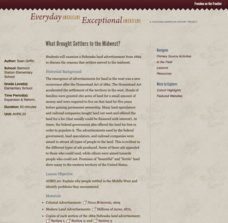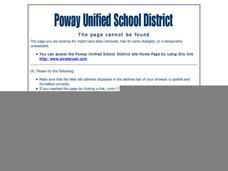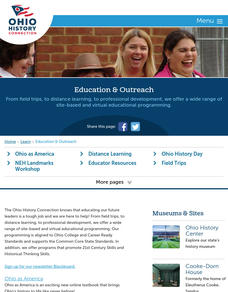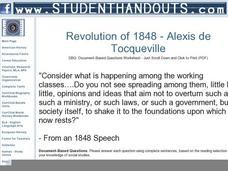Stanford University
Boston Massacre
The Boston Massacre was a propaganda victory for those protesting British rule over the American colonies. By using images from Patriots, as well as the testimony of witnesses, scholars consider what may have happened on that fateful day...
Roy Rosenzweig Center for History and New Media
What Brought Settlers to the Midwest?
Drawn by promises of fertile land, thousands of settlers poured West because of the Homestead Act of 1862. By examining images of the ads that drew them westward, learners consider the motivations for movement. They also consider how the...
iCivics
DBQuest: The Nashville Sit-In Movement
What was it like to be a part of the sit-ins during the Civil Rights Movement? Learners consider the question and whether the protests were effective using an online documents-based investigation. The program allows for virtual...
Alabama Department of Archives and History
African American Life After the Civil War - Sharecropping
What is the sharecropping system? What role did it play in the post-Civil War economy of the South? Who were the sharecroppers? Who employed them? How were they paid? To answer these questions, kids examine a series of sharecropper...
Urbana School District
Knocking Down Fences
After reading The Other Side and guiding children through a picture walk, third graders investigate evidence of the civil rights movement. In the mini unit, 3rd graders analyze photographs of the past and make connections between...
Curated OER
Studying the Life of Henry Bibb
After reading primary and secondary source materials about the life of Henry Bibb, individuals identify a core democratic value Bibb demonstrated and give examples drawn from their readings.
Curated OER
The Dust Bowl: Out of the Dust
Is your class going to read the novel, Out of the Dust? If so, you can prep them with a presentation that provides both images of the Dust Bowl and quotes from the book. Tip: Have learners use the images to compose descriptive...
Curated OER
Using Primary Sources: Letters from the Presidents
Students find out about the minds and thoughts of presidents through reading their actual letters. They explore the personal lives of presidents. They answer questions about a primary source. They write essays.
Curated OER
The Dust Bowl: Images
Introduce learners to the hardships that followed the onset of the Dust Bowl. There is a quote taken from The Dust Bowl, Men, Dirt and Depression by Paul Bonnifield followed by 10 primary-source images.
Curated OER
Legacy of the Dust Bowl: Dust Storm Media 1930s
Some learners might not realize that the term dust bowl was not figurative. Show the reality of 1930s America with eight primary source photographs. Slides depict images of dust storms or their aftermath.
Curated OER
Pictures from Korea: Shards of an Almost Forgotten Past
Learners explore the Korean War through photography. In this Korean War lesson, students examine photographs taken by a soldier and respond to question about them.
Curated OER
After: A Study of Individual Rights
Use the dystopian novel After by Francine Prose to spark discussion about individual and student rights. Learners read the novel, evaluating how far a school can go to control its attendees. As they read, scholars fill out a chart...
Curated OER
Service Projects in the Dominican Republic
Students examine the role of Peace Corps volunteers. In this service instructional activity, students investigate service projects that feature agriculture, small business, education, environmental education, and health concerns in the...
Curated OER
Excerpt from Edward Bain's The History of Cotton Manufacture in Great Britain (1835)
Great Britain was where the industrial revolution began. The class reads an excerpt from a document written in 1835 describing cotton manufacture in Great Britain. They then answer two critical analysis questions.
Curated OER
Using Primary Source Documents
Learners examine copies of primary source documents and determine the document's value to a researcher. They analyze and evaluate the document for bias or contradiction. They know the difference between a primary and secondary source.
Curated OER
Hugh Miller's The Old Red Sandstone (1841)
Pollution has been an issue since the advent of stratified society. Learners will read this excerpt from Hugh Miller's The Old Red Sandstone (1841) then answer two document-analysis questions.
Curated OER
Revolution of 1848 - Alexis de Tocqueville
Document-based questions are a great way to increase understanding of a primary source document or prepare learners for a class discussion. Here, they'll read an excerpt from Alexis de Tocqueville's speech regarding the revolution of...
Curated OER
Excerpt from Elizabeth Gaskell's Mary Barton (1848)
Answering document-based questions is a great way to build reading comprehension and critical thinking skills. Learners read an excerpt from Elizabeth Gaskell's Mary Barton, then answer two related questions.
Curated OER
1900 America: Primary Sources and Epic Poetry
Using Walt Whitman's Song of Myself and Hart Crane's The Bridge as models, class groups first craft their own epic poems for 1900 and, using primary sources, create a multi-media presentation that captures the sights and sounds of life...
Curated OER
Civil War Photographs: What Do You See?
A study of an image from The Library of Congress collection Civil War Photographs 1861-1865 launches an investigation of the connection between the Civil War and American industrialization. After analyzing “Petersburg, Va. The...
Curated OER
The Underground Railroad
High schoolers write about the impact of the Underground Railroad. They examine primary documents as they conduct independent research to explore the role of the Underground Railroad during the fight for abolition. They compose essays...
Curated OER
The Real World Revisited
Class members participate in a series of hands on, online, and multimedia activities to identify the difference between primary and secondary sources. They watch a related video and visit a variety of sites to locate primary and...
Curated OER
The Star-Spangled Banner
Get your kids moving as they learn about the history of the United States National Anthem. Scholars examine the War of 1812, Francis Scott Key, and the meaning behind The Star Spangled Banner as they listen to an 18-minute...
Curated OER
Compare Present Day Photographs to Historical Photographs from the Museum's Collection
Eighth graders discuss photojournalism and then compare present day to historical photographs. They discuss how photos capture daily life and historical events, compare historic photos to those seen today, then take and make a photo book...

























